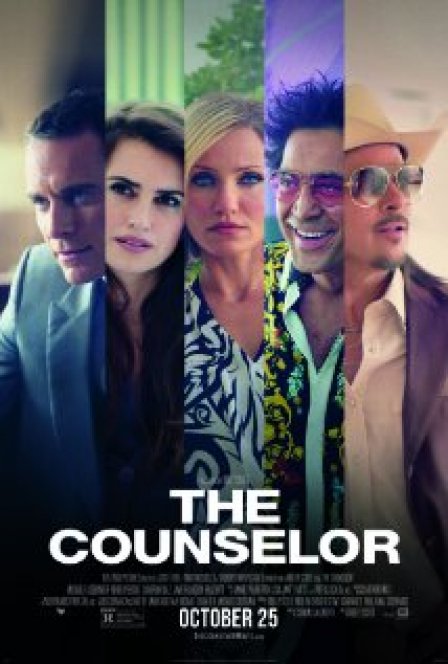Although it would not please the French to hear it, The Counselor is the new Cormac McCarthy film. Normally I’d be hesitant to attribute a film to the writer in place of the director, but the work is unmistakably McCarthy. Like his most famous novels, The Counselor takes place primarily on both sides of the Texas-Mexico border, in a world full of excess, greed, and manipulation. Characters lack restraint and boundaries, living in a world fringed by violence, aware of it but rarely witness to it. Violence occurs infrequently, in brief, matter-of-fact spurts, in counterpoint to the rest of the events of the film.
Typical of McCarthy’s novels and plays, The Counselor features several ruminations on life, death, love, and religion. While it is most likely these moments that may draw the biggest complaints about McCarthy — “That’s why he writes books, not movies,” I overheard at the screening — they remain one of the biggest draws to his work. The detachment, brevity and poetic tone of the insights into these subjects continue to be absorbing and heart breaking. Besides, “people don’t talk like that” is hardly a valid criticism: no one talks like the characters in a Wes Anderson or Whit Stillman film either.
Like No Country for Old Men, the McCarthy work that The Counselor most closely emulates (perhaps to a fault), the film concerns a drug deal gone awry. Michael Fassbender plays the titular Counselor, who is newly engaged to Laura (Penélope Cruz) and in need of money to pay for her engagement ring. He enters into a deal with associate Reiner (Javier Bardem) and Westray (Brad Pitt). In typical McCarthy fashion, unfortunate coincidences result in the shipment ending up in the wrong hands, with tragic consequences.
None of my increased focus on McCarthy is meant to belittle the contributions of director Ridley Scott. Primarily a visual director, Scott is an apt choice to complement McCarthy’s words. His singularity of vision elevates his science fiction films Alien, Blade Runner, and Prometheus (TMT Review), above standard sci-fi fare. Here, Scott delivers the world McCarthy’s script requires; equal parts opulent and dirty, high-tech and low-class.
Despite this, some scenes may actually work better in a novel, free from the hampering of accompanying visuals. The most notable example is one in which Reiner recounts to the Counselor an incident in which Malkina (Cameron Diaz) shares an intimate moment with his car, giving new meaning to the term “auto” erotic. The scene is played for laughs, and is quite effective (it will likely be the most infamous scene from the film) but McCarthy’s dialogue (“bottom feeders… sucking its way up the glass”), along with Bardem’s delivery carry enough weight and imagery that the scene doesn’t gain anything by including cutaways of Cameron Diaz humping a windshield.
Elsewhere the filmmakers seem too focused on re-creating the most memorable parts of No Country for Old Men. There is a new, gruesome murder weapon that’s more primitive but less disturbing than Chigurh’s captive bolt pistol. Bardem as Anton Chigurh is one of the best things about No Country for Old Men, and in The Counselor he is again given a distinctive (if not silly) visual style. His rose-tinted glasses, butterfly-print satin shirts, and Brian Grazer hair all reveal not only Reiner’s excesses but also his lack of awareness. But despite these attempts at creating memorable characters like Anton Chigurh or Judge Holden, McCarthy and the filmmakers largely come up short. Even the Counselor himself is largely uninteresting.
But none of these shortcomings keep the movie from pleasing. The dialogue is strong, the cast is sexy, and the second act propels the film forward with enough momentum to make up for the less-than-cinematic finale. It’s also refreshing to see a big-budget film — released by a major studio, with a crop of A-list stars — have such a bleak ending. Late in the film, a man says to the grieving Counselor that some believe death has no meaning. “Do you believe that?” the Counselor asks, to which the man responds: “Of course not. All my family is dead. I am the one who has no meaning.” In August of 2012, while Scott was filming The Counselor, his brother and fellow director Tony Scott committed suicide. A meaningless and hopelessly sad event made cruelly ironic by lines like this. One of art’s functions can be to help us understand and cope with loss, and while The Counselor is not a perfect film, it is a damn entertaining one. If nothing else, it will at least help you forget your own troubles.

